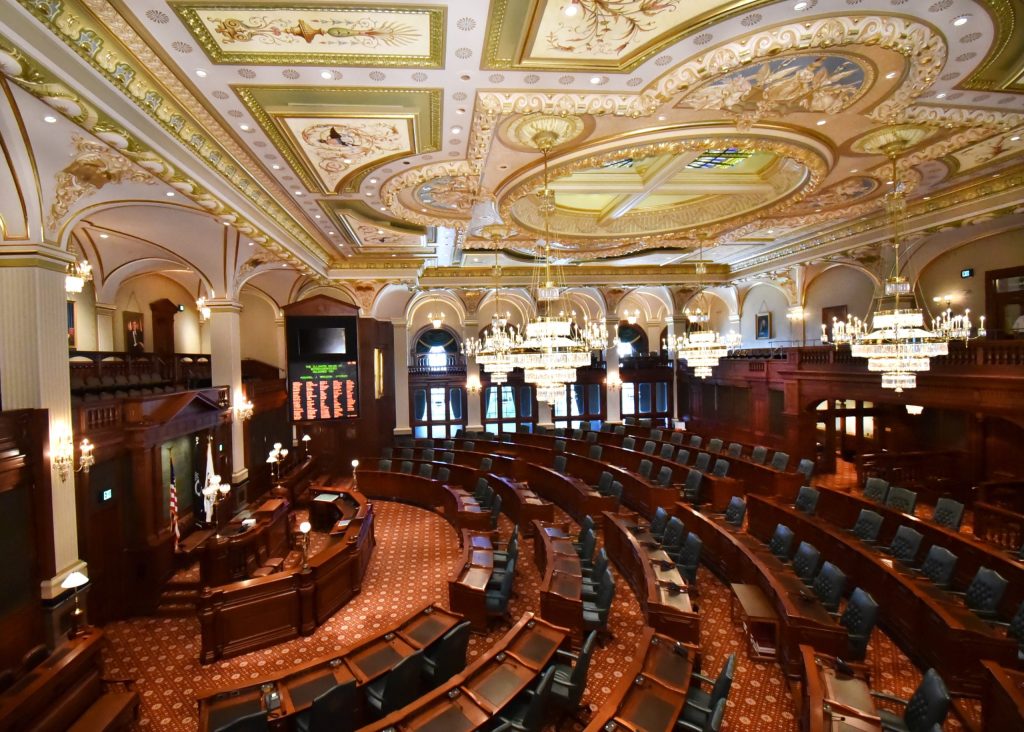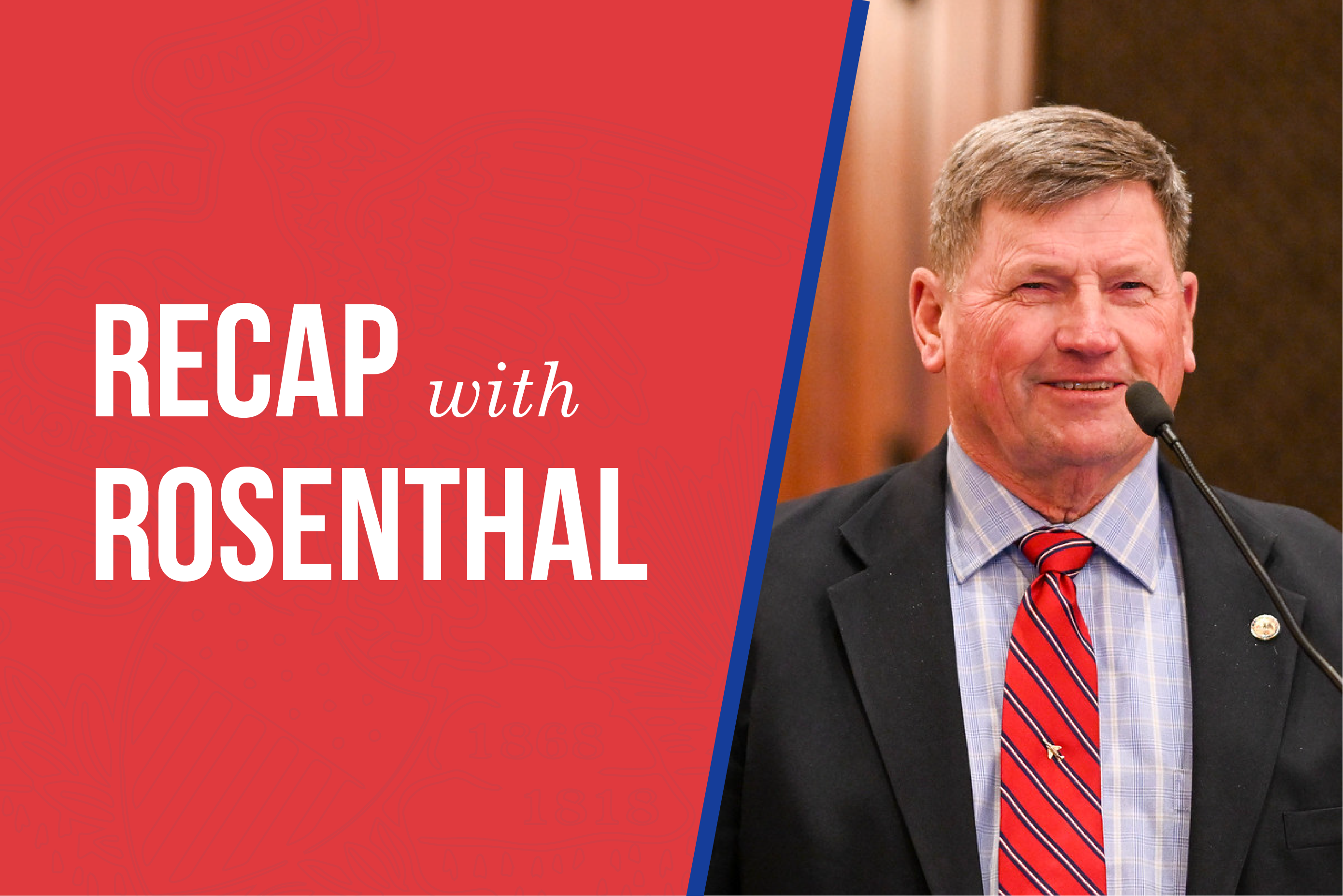GENERAL ASSEMBLY
Illinois General Assembly to convene for fall veto session. The first of two weeks of the General Assembly’s fall veto session will begin on Tuesday, October 24.Lawmakers will consider not only Governor Pritzker’s vetoes of bills enacted in the spring session, but also new legislative business. As completely new legislation must be approved by a supermajority vote during veto session, minority Republicans could have a voice in any new legislation that moves forward.
The Illinois House has posted its veto session calendar online. After taking a break for Halloween, the General Assembly will wrap up its veto session work on Thursday, November 9, the day before Veterans’ Day.

BUDGET
Cost of State health benefits program for undocumented immigrants soars to $831 million. The State of Illinois provides free healthcare benefits for undocumented immigrant adults ages 42 and up, as well as healthcare benefits for undocumented immigrant children. The taxpayer-funded health benefits program for undocumented immigrant seniors was enacted by Democrat supermajorities during the 2020 pandemic-shortened special session and was expanded in subsequent years to include immigrant adults ages 42-64.
Earlier this year, the Illinois Department of Healthcare and Family Services (HFS) revealed that the estimated cost of Illinois’ healthcare benefits program for undocumented immigrants had ballooned to $1.1 billion. Undocumented immigrants are ineligible for any federal Medicaid match, resulting in State funds being used to pay for the entirety of services provided.
House Republicans argued that these ballooning enrollments and costs were unsustainable and would lead to the loss of funding and services for Illinois’ most vulnerable citizens. We called for a moratorium on enrollment and expansion of this benefits program, as well as an audit of program costs.
Instead of taking action to reduce the cost of this massive taxpayer-funded program, Illinois Democrats kicked the can to Governor Pritzker to “manage” the program.
This week, the HFS announced a temporary pause on new enrollees in the Health Benefits for Immigrant Seniors program, as the program hits its enrollment cap of 16,500 individuals.
However, HFS has still not implemented co-pays and other cost-sharing measures and it is unclear if the administration will be able to contain costs at the $550 million amount appropriated for the program.
The latest cost estimates from HFS show that those caps – combined with administrative delays in launching copay and co-insurance requirements for enrollees – have failed to control program spending.
An analysis dated September 2023 from the HFS website shows the program is expected to cost $831 million in FY 2024, more than $280 million beyond the allocated amount. That estimate was based on total program enrollment of nearly 69,000 individuals.
Illinois taxpayers cannot afford to pay for free healthcare benefits for undocumented immigrants, especially at a time when healthcare costs for our own citizens continue to skyrocket.
ENERGY
Another hike in Illinois natural gas rates advances through the ICC. The price hike, a joint request by Illinois’ four largest natural gas utility suppliers (Ameren, Nicor, North Shore Gas, and Peoples Gas), was advanced this week by administrative-judge panelists at the Illinois Commerce Commission (ICC), the State’s public-utility rate-regulation authority. The proposed rate hike, which would affect 4.1 million customers throughout the state, now goes to the full Commission for final approval. If approved, the rate hikes would show up in customer bills in January 2024.
Nationwide prices for natural gas have stabilized in recent months. However, Illinois’ largest natural gas utilities continue to state that their return-on-equity-investment standing justifies further hikes in rates paid by consumers. The utilities state that continued increases in the cost of rebuilding and maintaining their supply infrastructure justify the higher rates. To buttress their position, the larger Illinois gas utilities coordinated their rate-hike positions, and filed papers that the ICC could hear jointly. Many advocacy groups have submitted written filings to the ICC in opposition to the rate hike proposal.
Many power generating plants, and some combustion engines, could run on hydrogen. The lighter-than-air gas burns cleanly and generates water vapor. Pursuant to bipartisan action by the Illinois General Assembly, the U.S. Department of Energy this week selected the Illinois-led Midwest Alliance for Clean Hydrogen (MachH2) as a recipient of federal aid to create a “hydrogen hub.” The Midwest Alliance is slated to receive $1 billion in federal assistance to build out the MachH2 hydrogen hub.
Testimony before the Illinois Revenue and Finance Committee indicates that hydrogen-hub work will include laying a network of pipelines from hydrogen plants (including plants connected to non-carbon energy sources) to power plants that use boilers to generate electricity. This would allow these plants to switch over from natural gas to hydrogen. More speculative projects center on refitting mobile combustion engines, such as Class 8 trucks, to burn hydrogen. Significant developmental work will be necessary to move forward on this class of prospects.
The Illinois House and Senate enacted a major hydrogen-hub stimulus bill, HB 2204, in May 2023. The bill creates tax incentives for companies that use energy and switch over to zero-carbon hydrogen. This measure was enacted as part of Illinois’ and the Midwest Alliance’s application for federal standing.
TAXES
Survey once again finds Illinois has top-10 property tax burden. The nonpartisan Tax Foundation has surveyed the median property tax burdens borne by homeowners in all 50 states. Based on 2021 U.S. Census data, the Tax Foundation has labeled Illinois the 6th most expensive state in the United States in terms of median annual property tax bills. In addition to its top-10 status, Illinois had the highest property tax burden of any state outside of the U.S. Northeast. The median Illinois annual property tax bill, according to the Tax Foundation, is $4,744. This is equivalent to an additional housing cost of almost $400/month for the median Illinois residential home. Each Illinoisan’ property tax bill is based upon local assessment conditions, and many Illinois residents face much higher burdens.
Of the 50 U.S. states, 44 have lower median property tax bills than Illinois. The disparity is dramatic along the Illinois-Indiana border; the Hoosier State (43rd overall) mails its homeowners a median bill of $1,308/year, only a bit more than one-quarter the bills charged in Illinois. The neighboring states of Iowa, Kentucky, Missouri, and Wisconsin also enjoy much lower property tax bills than Illinois.
TRANSPORTATION
Peak season for deer collisions. The Illinois Department of Transportation (IDOT) cautioned drivers not to try to swerve (especially on narrow roads) to avoid deer. With deer in mating season and searching for new territories, deer are especially common sights in the evening and at night. Other tips for deer avoidance include:
- Watch for deer crossing signs posted on public streets and highways.
- Be on the lookout for eye-shine – the reflections of headlights from deer eyes – on the sides of the road.
- Assume that each deer could be closely followed by one or more fellow deer.
- The deer-in-the-headlights reaction, when an animal (particularly a yearling deer) sees an oncoming car and freezes in helpless ignorance in the middle of the road, is very real.
IDOT counted 14,524 deer-vehicle collisions in 2022 that were reported to authorities. This leaves out the incidents that were taken directly to a body shop or other repair setting without being reported. Of the reported crashes, 629 resulted in injuries, and four led to fatalities.
